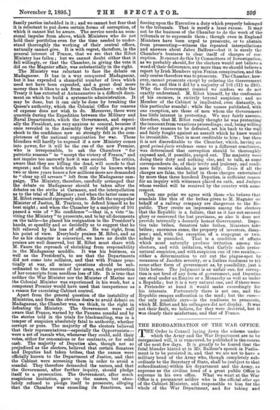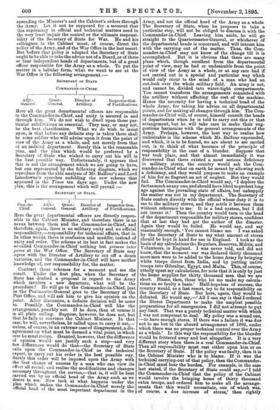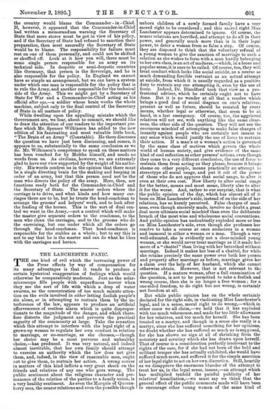THE REORGANISATION OF THE WAR OFFICE. T HE Order in Council
laying down the scheme under which the Army and the War Department are to be reorganised will, it is rumoured, be published in the course of the next few days. It is greatly to be feared that the fatal blunder hinted at in Mr. Balfour's speech in Parlia- ment is to be persisted in, and that we are not to have a military head of the Army who, though completely sub- ordinate to the Secretary of State, shall be (subject to that subordination) within his department and the Army, as supreme as the civilian head of a great public Office is supreme in his own office. What we want at the War Office is a permanent soldier who is the official alter ego of the Cabinet Minister, and responsible to him for the whole of the War Department, and for taking and spreading the Minister's and the Cabinet's orders through the Army. Let it not be supposed for a moment that this supremacy in official and technical matters need in the very least impair the control or the ultimate responsi- bility of the Secretary of State for War. He and his colleagues in the Cabinet must, of course, direct the policy of the Army, and of the War Office in the last resort. But before that policy is adopted the Secretary of State ought to be able to take the advice not of a Board, or of three or four independent heads of departments, but of a great officer responsible for the Army as a whole. To put the matter in a tabular form, what we want to see at the War Office is the following arrangement :-
SECRETARY OF STATE COMMANDER-IN-CHIEF.
Adjt.- Qruar.- Director of Inspector-Gen. General. General. Artillery. of Fortifications.
Here all the great departmental officers are responsible to the Commander-in-Chief, and unity is secured in and through him. We do not wish to dwell upon these par- ticular subdivisions as essential. They may, or may not, be the best classification. What we do wish to insist upon, is that before any definite step is taken there shall be some soldier who will advise upon it from the point of view of the Army as a whole, and not merely from that of an isolated department. Surely this is the reasonable plan, and the plan which would be preferred by a Secretary of State who wished to carry out his will in the best possible way. Unfortunately, it appears that this is not the arrangement which we are going to have, but one represented by the following diagram, which we reproduce from the able analysis of Mr. Balfour's and Lord Lansdowne's speeches unfolding the new scheme that appeared in the Times ten days ago. Under the new plan, this is the arrangement which will prevail :—
SECRETARY OF STATE.
Adjt.- Qrmr.- Director of Inspector-Gen.
Chief. General. General. Artillery. of Fortifications.
Here the great departmental officers are directly respon- sible to the Cabinet Minister, and therefore there is no nexus between them and the Commander-in-Chief, and therefore, again, there is no military unity and no official responsibility,—responsibility for technical affairs, that is. In other words, there is confusion and muddle, instead of unity and order. The scheme at its best in fact makes the so-called Commander-in-Chief nothing but primes inter pares at the War Office. The Secretary of State may agree with the Director of Artillery to cut off a dozen batteries, and the Commander-in-Chief will have neither knowledge of, nor responsibility for, the matter.
Contrast these schemes for a moment and see the result. Under the first plan, when the Secretary of State has drafted a proposal in regard to the Army which involves a new departure, what will be the procedure ? He will go to the Commander-in-Chief, just as the Postmaster-General goes to the Secretary of the Post Office, and will ask him to give his opinion on the point. After discussion, a definite decision will be come to. Possibly the Commander-in-Chief will like the arrangement, possibly not. If he does, then of course it is all plain sailing. Suppose, however, he does not, but that he fails to convince the Cabinet Minister. In that case, he will, nevertheless, be called upon to carry it out,— unless, of course, in an extreme case of disagreement, a dis- agreement on what must be deemed a vital point, in which case he must resign. Granted, however, that the difference of opinion would not justify such a step—and very few differences would do that—the Secretary of State calls upon the Commander-in-Chief as the technical expert, to carry out his order in the best possible way. Surely this order will be imposed upon the Army with the best chance of success by a man who can view its effect all round, and realise the modifications and changes necessary throughout the service,—that is, it will be best carried out by an official head of the Army such as we desire to see. Now look at what happens under the plan which makes the Commander-in-Chief merely the official head of the most important department in the Army, and not the official head of the Army as a whole. The Secretary of State, when he proposes to take a particular step, will not be obliged to discuss it with the Commander-in-Chief. Leaving him aside, he will go straight to the Quartermaster-General, or whichever of the departmental heads is concerned, and will intrust him with the carrying out of the matter. Thus, the Com- mander-in-Chief may not know of the change till it is accomplished. But it is obvious that there are many plans which, though excellent from the departmental point of view, may be bad or undesirable from the point of view of the Army as a whole, or at any rate bad if not carried out in a special and particular way which would only occur to the mind of a man who had an out-look over the whole military field. An army is not, and cannot be, divided into water-tight compartments. You cannot transform the arrangements connected with the artillery without affecting the rest of the machine. Hence the necessity for having a technical head of the whole Army, for taking his advice on all departmental points, and for making all changes through him. The Com- mander-in-Chief will, of course, himself consult the heads of departments when he is told to carry out this or that arrangement, but he will take care to make their sug- gestions harmonise with the general arrangements of the Army. Perhaps, however, the best way to realise how undesirable is the scheme which Mr. Balfour expounded, and which, it is to be feared, we are about to see carried out, is to think of what becomes of the principle of responsibility in the case of a blunder. Suppose that war took place, and that almost immediately it was discovered that there existed a most serious deficiency in military stores, the country would ask the Com- mander-in-Chief what on earth he meant by allowing such a deficiency, and they would propose to make an example of him for so flagrant an act of neglect. But they would fail. The Commander-in-Chief would say, I deplore the fact as much as any one, and should have liked to protest long ago against the prevailing state of affairs, but unhappily the matter was not in my department. The Secretary of State confers directly with the official whose duty it is to see to the military stores, and they settle it between them without reference to me. It is a bad system, but I did not invent it.' Then the country would turn to the head of the department responsible for military stores, confident that at last they had got the author of the disaster. Again they would be foiled. He would say, and say reasonably enough, You cannot blame me. I was asked by the Secretary of State to say what amount of stores should be kept in hand for use in England. I took as the basis of my calculations the Regulars, Reserves, Militia, and Volunteers, in England. I was never told, and did not know, that the moment war was declared thirty thousand more men were to be added to the home Army by bringing white troops direct from India, and by putting native troops into Gibraltar, Egypt, and Malta. This, of course, utterly upset my calculations, for note that it is only by just the home supplies for thirty thousand men that we are short. Blame, then, those who let me make my calcula- tions on so faulty a basis.' Half-hopeless of success, the country would, as a last resort, try to fix responsibility on the Secretary of State. But here, again, they would be defeated. He would say,—' All I can say is that I ordered the Stores Department to make the amplest possible preparations for all emergencies. I did not attempt to put any limit. That was a purely technical matter with which I was not competent to deal. My policy was a sound one, —to have enough stores. If there was a failure it was due not to me but to the absurd arrangement of 1895, under which there was no proper technical control over the Army as a whole.' In this way the responsibility for the blunder would be frittered away and lost altogether. It is a very different story when there is a real Commander-in-Chief. Then all responsibility must rest either upon him or on the Secretary of State. If the policy was faulty, then it is the Cabinet Minister who is to blame. If it was the technical carrying-out of that policy, then the Commander- in-Chief must bear the burden. For example, in the case last stated, if the Secretary of State could say,—' I told the Commander-in-Chief that the policy of the Cabinet would involve the bringing home of thirty thousand extra troops, and ordered him to make all the arrange- ments that this would necessitate, one of which was, of course, a due increase of stores,' then rightly the country would blame the Commander - in - Chief. If, however, it appeared that the Commander-in-Chief had written a memorandum warning the Secretary of State that more stores must be got in view of his policy, and if the Secretary of State had refused to sanction their preparation, then most assuredly the Secretary of State would be to blame. The responsibility for failure must rest on one of them personally, and could not be shifted or shuffled off. Look at it how you will, there must be some single person responsible for an army on its technical side. In despotic or semi-despotic countries like Germany, that person is the Sovereign, and he is also responsible for the policy. In England we cannot have so simple an arrangement, but we can have a system under which one man is responsible for the policy that is to rule the Army, and another responsible for the technical side of the Army. This we might get by a Secretary of State for War and a Commander-in-Chief acting as his official alter ego,—a soldier whose brain works the whole machine, subject only to the final control of the Secretary of State in all matters of policy. While dwelling upon the appalling mistake which the Government are, we fear, about to commit, we should like to draw the attention of our readers to the important pre- face which Mr. Spenser Wilkinson has added to the new edition of his fascinating and most valuable little book, " The Brain of an Army ' (Constable). He there discusses the question we have just been discussing, and comes, it appears to us, substantially to the same conclusion as we do. Mr. Wilkinson's competence to speak on these matters has been vouched for by Moltke himself, and needs no words from us. As civilians, however, we are extremely glad to have our view supported by the weight of his autho- rity. His words confirm us in the opinion that there must be a single directing brain for the making and keeping in order of an army, but that this person need not be the man who directs the policy of the army. Here, then, are functions ready both for the Commander-in-Chief and the Secretary of State. The master orders where the carriage is to drive, and what kinds and how many car- riages there are to be, but he trusts the head-coachman to arrange the grooms' and helpers' work, and to look after the feeding of the horses. This is the sort of dual con- trol we want in the Army,—not a control which will make the master give separate orders to the coachman, to the men who clean the carriages, and to the grooms who do the exercising, but one under which all the orders go through the head-coachman. That head-coachman is responsible for the stables as a whole ; but to say this is not to say that he is the master and can do what he likes with the carriages and horses.




















































 Previous page
Previous page